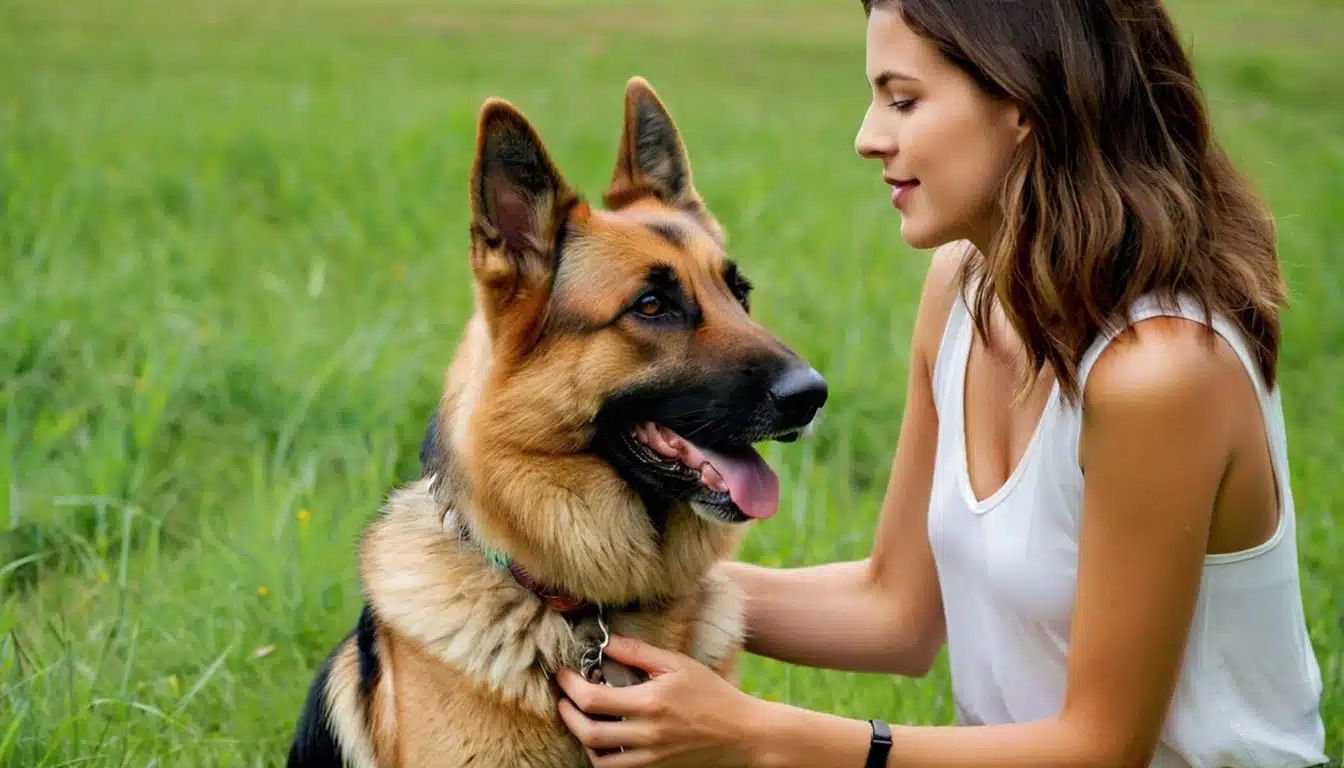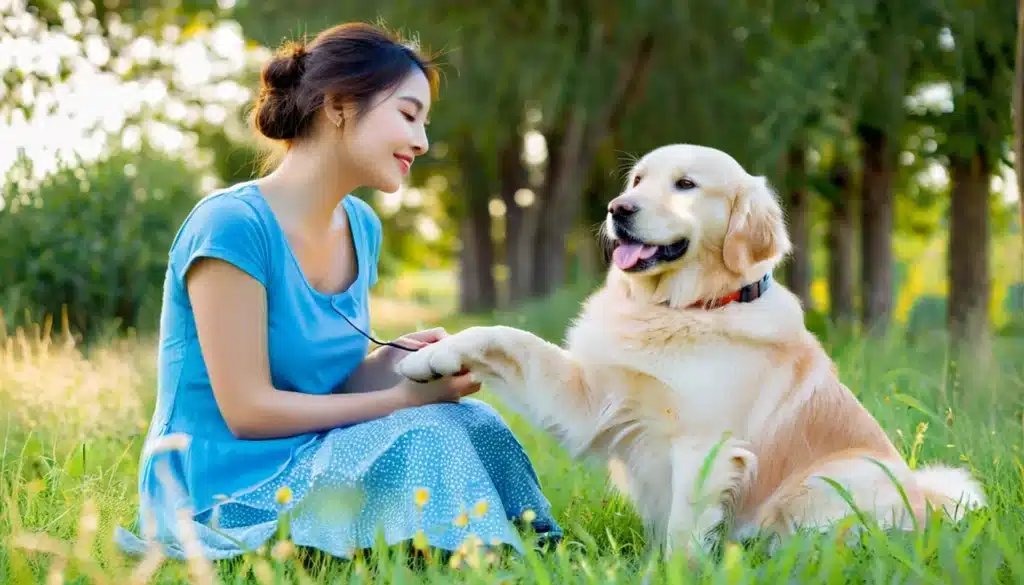When I brought my German Shepherd home, I knew it was special. These dogs are more than pets; they're smart friends with a big heart. Training them is about creating a strong bond, not just teaching tricks.
Every German Shepherd has a hidden talent waiting to be found. Their smarts make them top-notch learners. With the right training, they can be amazing helpers, protectors, and family members.
It's important to know what makes German Shepherds unique. Their energy, intelligence, and drive need a special training approach. This path requires patience, dedication, and a deep understanding of their nature.
Key Takeaways
- German Shepherds are highly intelligent and require consistent training
- Proper training transforms dogs into exceptional companions
- Understanding breed-specific traits is essential for effective training
- Training is about building a strong bond, not just teaching commands
- Patience and dedication are key to successful German Shepherd training
Understanding German Shepherd Behavior and Psychology
Recent studies from the University of Illinois College of Veterinary Medicine (University of Illinois veterinary behavior research on working breeds) reveal that German Shepherds possess unique neurological adaptations that make them exceptionally responsive to structured training. Their research shows these dogs have enhanced spatial memory and problem-solving capabilities compared to other breeds, which explains why they excel in roles like police work and search-and-rescue.
However, these same traits can lead to behavioral challenges if the dog's mental stimulation needs aren't properly met through training and enrichment activities.
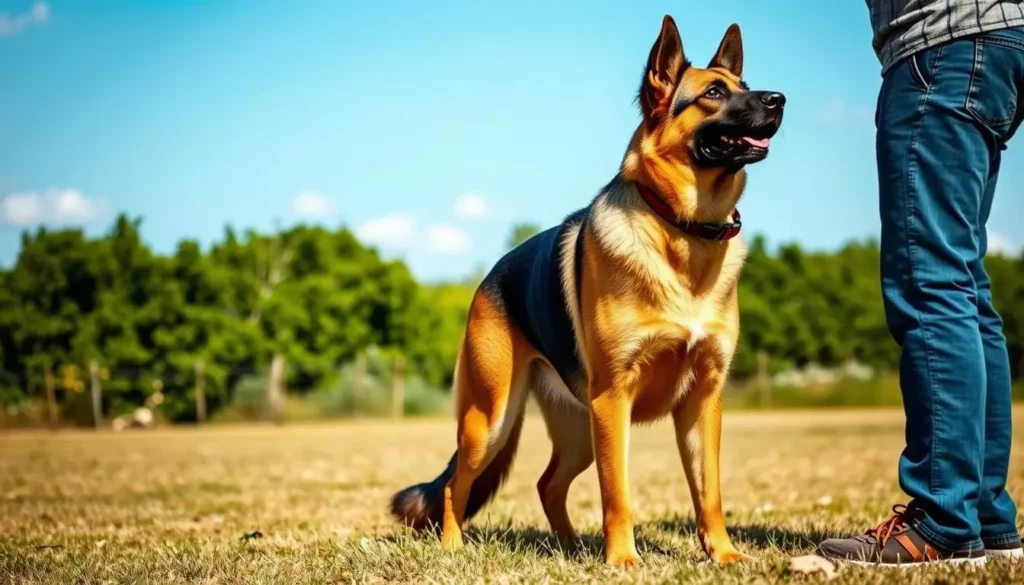
To understand German Shepherd issues, we must know their instincts and minds. They are more than pets; they are smart workers with deep feelings.
Natural Instincts and Drives
German Shepherds have special drives:
- Strong protective instincts
- High intelligence and problem-solving skills
- Intense desire to work and learn
- Powerful herding background
Because of their herding past, they might act controlling. This can show as a snarl when they feel unsure or scared.
Common Behavioral Traits
There are key traits in German Shepherds that owners should know:
| Trait | Description | Potential Challenge |
|---|---|---|
| Loyalty | Extremely devoted to family | Potential over-protectiveness |
| Intelligence | Quick learners | Requires constant mental stimulation |
| Energy Level | High activity requirement | Potential destructive behavior if under-exercised |
Knowing these traits helps owners deal with German Shepherd issues. The right training can turn these problems into assets.
Essential German Shepherd Training Techniques
Training a German Shepherd needs a smart plan. They are very smart and work hard. They do great in jobs like service dogs and therapy dogs. So, training them well is key.
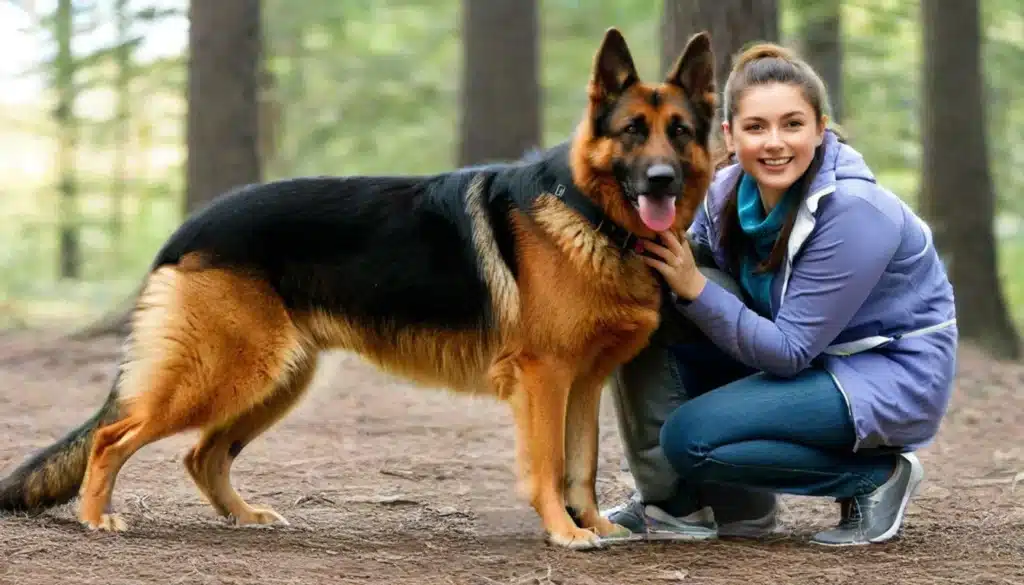
First, know your dog's personality and how they learn. Trainers say to use patience, be consistent, and use positive methods.
Positive Reinforcement Methods
Positive reinforcement is the best way to train dogs today. German Shepherds love to please and learn. Here are some good ways to use this method:
- Use high-value treats as rewards
- Give praise right away when they do something right
- Keep training sessions short and fun
- Change up what you use to reward them to keep them interested
As a trainer for German Shepherd service dogs, I've seen how well these methods work. The goal is to make training fun and rewarding for your dog.
Establishing Leadership and Trust
German Shepherds do best with calm, confident leaders. Being a trustworthy guide helps avoid bad behavior and makes your bond stronger. This is especially important for therapy dogs, who need to stay calm in different places.
"Training is about building a relationship of mutual respect and understanding." - Professional Dog Training Expert
By using these methods, you'll bring out your German Shepherd's amazing abilities. They can be service dogs, therapy dogs, or just wonderful family pets.
Basic Obedience Training for German Shepherds
Training a German Shepherd needs patience, consistency, and understanding their smart nature. As a dog owner, I've found that learning basic obedience commands is key. It helps build a strong bond and clear communication with your GSP.
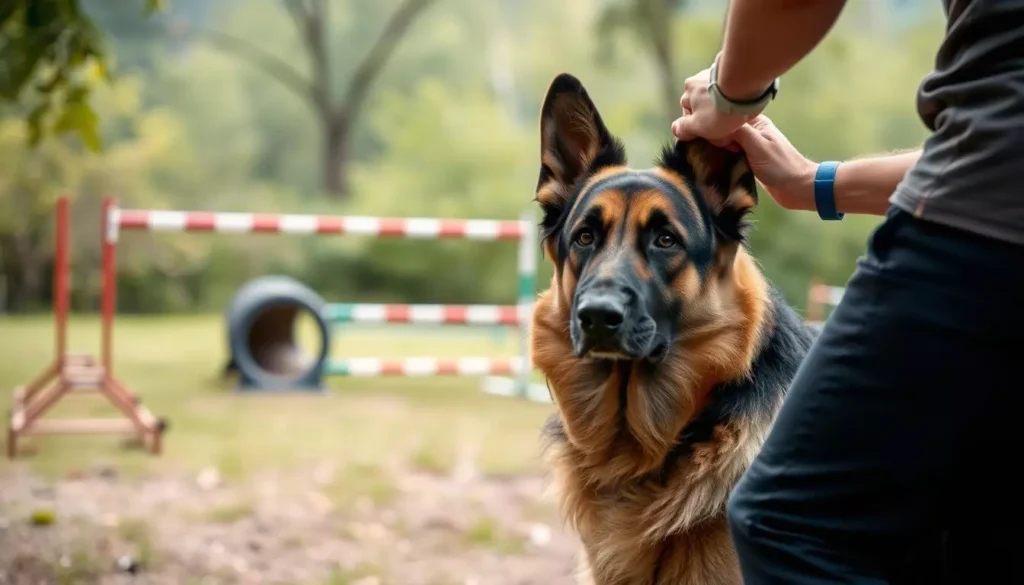
The base of German Shepherd training is about mastering basic skills. These skills make your dog well-behaved and responsive. They also improve your dog's behavior, safety, and understanding between you and your dog.
Essential Commands for German Shepherds
- Sit: The most basic command that helps control your dog in various situations
- Stay: Critical for maintaining control and preventing potential dangerous scenarios
- Come: A potentially life-saving command that ensures your dog returns immediately
- Down: Helps manage your dog's energy and demonstrates your leadership
Mastering Leash Training and Walking Etiquette
Leash training is key for German Shepherds. A well-trained German Shepherd walks calmly beside you without pulling. This makes walks enjoyable for both dog and owner.
Here are some tips for leash training:
- Use consistent verbal and physical cues
- Reward good behavior with treats and praise
- Practice short training sessions
- Maintain a calm and confident demeanor
Remember, every training session is an opportunity to strengthen your bond and communication with your German Shepherd.
Advanced Training for German Shepherds
German Shepherds are known for their smartness and adaptability. They excel in many professional roles. This makes them great as service and therapy dogs.
Advanced training turns these smart dogs into skilled partners. The right training can unlock their full potential in many areas.
Off-Leash Control: Mastering Precision
Getting off-leash control takes time and consistent effort. Important steps include:
- Building strong basic obedience
- Using high-value rewards
- Practicing in more challenging places
- Keeping clear communication
Agility and Scent Work: Challenging Mental Stimulation
German Shepherds love challenges that test their minds and bodies. Agility and scent work are perfect for this:
- Agility training boosts coordination and confidence
- Scent work uses their natural tracking skills
- These activities strengthen the bond between dog and handler
Professional training can turn a German Shepherd into an amazing service or therapy dog. They can help people in incredible ways.
The key to advanced training is understanding your dog's unique abilities and what motivates them.
Addressing Common German Shepherd Behavioral Issues
German Shepherds can be tough for owners to handle. They are smart and full of energy. They need special care and training to avoid problems.
Having a 1 year old German Shepherd brings its own set of challenges. Owners often struggle with their dog's biting and high energy.
Excessive Barking and Aggression Management
Excessive barking can be caused by a few things:
- Lack of mental stimulation
- Territorial instincts
- Anxiety or fear
- Attention-seeking behavior
"Understanding your German Shepherd's communication is key to managing their barking," says professional dog trainer Sarah Mitchell.
Addressing Separation Anxiety and Destructive Behavior
German Shepherds love their families a lot. This can cause them to get very upset when left alone. They might bite or destroy things.
To handle these issues, try these:
- Gradual desensitization to departures
- Providing interactive toys
- Creating a consistent routine
- Using positive reinforcement techniques
Professional training and consistent intervention can significantly reduce behavioral challenges and create a well-adjusted German Shepherd.
Socialization and Confidence Building for German Shepherds
Raising a well-adjusted German Shepherd needs careful socialization and confidence-building. The early months are key for a balanced, confident adult dog. Understanding the German Shepherd puppy biting phase is crucial.
Why do German Shepherd puppies bite so much? It's because they're exploring the world and teething. They use their mouths to learn about their environment and social boundaries.
Early Socialization Techniques
Effective socialization means exposing your German Shepherd to different things during their critical period. Important strategies include:
- Introducing your puppy to various people, animals, and places
- Using positive reinforcement in new experiences
- Creating safe, controlled interactions
- Avoiding scary or overwhelming situations
Building Confidence in Timid Dogs
Some German Shepherds are naturally more reserved. To boost their confidence:
- Begin with gentle, low-stress experiences
- Use treats and praise to create positive associations
- Gradually increase exposure to new situations
- Never force interactions that cause anxiety
Remember, patience and consistent positive reinforcement are key to helping your German Shepherd develop into a confident, well-socialized companion.
House Training and Potty Training Your German Shepherd
Potty training a German Shepherd puppy needs patience, consistency, and a good plan. As a dog owner, I've found that starting early and following a routine is key.
Understanding your puppy's natural behaviors is important when starting potty training. Puppies usually need to go:
- Right after waking up
- After eating or drinking
- After playing
- Before bed
Establishing a Consistent Routine
Having a set schedule helps avoid accidents. Take your puppy outside to the same spot every 1-2 hours. Puppies usually get bladder control by 4-6 months, but it can take a year to fully train.
Managing Accidents and Setbacks
Accidents are part of potty training. Never punish your German Shepherd puppy for mistakes. Instead, praise and treat them when they go in the right spot. Clean up accidents well to avoid them happening again.
Consistency and patience are your greatest tools in successful German Shepherd potty training.
When should you start potty training a German Shepherd? Basic training starts at 8 weeks, but full training takes 4-6 months. Keep going, stay positive, and your puppy will learn to use the bathroom right.
Exercise and Mental Stimulation for German Shepherds
German Shepherds are full of energy and need lots of physical and mental activities. They are smart and can do many jobs, which keeps them happy and healthy. They love activities that challenge them both physically and mentally.
It's important to keep them active to avoid bad behavior and keep them well. I've learned that a German Shepherd who is well-exercised is happy and well-balanced.
Physical Exercise Requirements
German Shepherds need a lot of exercise every day. This helps keep their muscles strong and their energy up. Here are some good exercises for them:
- Daily walks of 60-90 minutes
- Running or jogging
- Fetch and retrieval games
- Swimming
- Hiking on varied terrains
Mental Stimulation Activities and Games
These smart dogs also need mental challenges. Here are some activities that are good for them:
- Puzzle toys that dispense treats
- Scent work and tracking exercises
- Advanced obedience training
- Agility course navigation
- Interactive play sessions
"A tired German Shepherd is a happy German Shepherd" - Professional Dog Trainer
By mixing physical and mental activities, your German Shepherd will become a confident and well-rounded friend. They'll be ready for any challenge.
Maintaining Training and Continued Learning
Training a German Shepherd is a lifelong journey. It needs constant effort and patience. As your dog learns basic commands, it's important to keep challenging them. Training a German Shepherd is not just about reaching a goal. It's about growing and connecting with your dog every day.
It's key to keep practicing what your dog has learned. I suggest having regular practice sessions. This keeps their skills sharp and your bond strong. Some people even train their dogs to be service or therapy dogs.
Reinforcing Learned Behaviors
Regular practice stops skills from fading in German Shepherd training. Short, frequent sessions are best. They should focus on repetition and positive feedback. Also, train in different places to ensure your dog can follow commands anywhere.
Introducing New Challenges
Advanced training offers new chances for German Shepherds. It prepares them for roles like service or therapy dogs. Complex tasks keep your dog's mind active, prevent boredom, and use their intelligence and working dog nature.

